A Lift Up to Law School
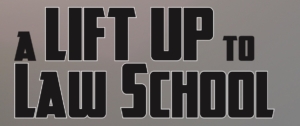
As part of her freshman year at Heritage University in 2018, Maria Rivera did an internship in Laredo, Texas, translating for attorneys on immigration cases.
“We’d go into the detention center early every morning,” Rivera said. “The first time we were seated with the attorney and a law student in frontof me, and then the clients, who were both Mexican women, came in. They look like they hadn’t slept in days.
“They saw these two white men first before turning their heads toward me. I saw the relief on their faces once they saw me. And that’s when I knew there needed to be more black and brown female attorneys.
“I knew that was the only way that people like this, who are seeking justice, could feel reassured, so they could be at peace knowing that their attorneys understand where they’re coming from.
“That was when I decided I needed to become a lawyer.”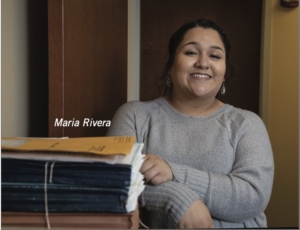
Rivera spent the next four years focused on her goal. She majored in criminal justice and history, completed internships at other law firms, and participated in several law-focused events at Heritage that taught her more about the profession. When she graduated in 2020, she went to work as a legal assistant for a Yakima- area law firm, but she had endless questions about how to actually get into law school.
This past summer, she and 35 other Heritage students and alumni and other local community members– all aspiring Latinx or Indigenous lawyers – had all their questions answered.
They participated in a new Heritage program called the “Law School Admission Council (LSAC) Prelaw Undergraduate Scholars Program” – “PLUS” for short – created solely for that purpose.
A partnership between Heritage and the state’s three law schools at Seattle University, University of Washington, and Gonzaga University, its overarching goal is to help diversify the state’s lawyer population.
Diana López Batista, program director, understood the students’ challenges. She had navigated her way into law school – but she’s the exception.
“Most Latinx and indigenous students have no point of reference,” said López Batista, who works in employment law and labor trafficking through a grant from the Northwest Justice Project. “They don’t typically have family or friends who can advise or mentor them, and that’s a major handicap because the road to law school is filled with challenges.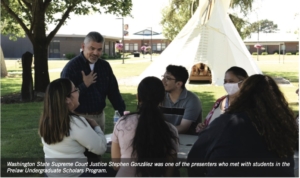
“You have to get through the LSAT, which is huge. You have to write a bio and a personal statement that will bring you to the attention of the school. You have to leave home and leave the Valley. You have to figure out how to pay for it all. The list is endless.”
And that, she said, is the easy part. There are still three to five years of law school with its intensive study and competitive clerkships and internships, not to mention passing the bar exam after graduating and landing that first job.
LATEST LAW- FOCUSED OFFERING
The law school prep course is the latest in a continuing line of law-focused events at Heritage, offerings that illustrate a strong interest in studying law among a significant number of Heritage students.
The Washington State Supreme Court has heard cases on campus in a “traveling court,” and State Supreme Court Justice Stephen González has been on campus several times to meet with students. Various forums have led to a lunchbox series where guest attorneys – typically Latinx and Indigenous – came to campus and talked about their educational and professional journeys.
“We knew from spending time with students at these events that we had a lot more territory to cover,” said Kim Bellamy-Thompson, chair of the university’s criminal justice department and an architect of the PLUS program. “I think the really healthy number of students who took this class, especially considering the size of our institution, really says a lot.”
The PLUS class started with an overview of the rigorous admission process and covered everything from the basics of the United States legal system to personal well-being strategies once in law school. During the last week, faculty and students toured all three law schools, sitting in on classes and talking with students, instructors and admissions staff. 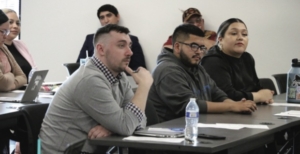
“From LSAC prep books to having area attorneys speak to our students and then touring the law schools, we tried to cover it all,” said Bellamy-Thompson. ”First and foremost, we had to have every participant leave here with a basic understanding of the law school admission process, feeling they could move ahead.”
PASSION FOR MAKING A DIFFERENCE
These days, Rivera is busy getting ready to enter law school. She took the Law School Admission Test (LSAT) this fall and is now applying to several schools. She and other class members talk frequently using their Instagram handles and texting.
To anyone who has thought about becoming an attorney “for even 30 seconds,” she said, “I would definitely recommend this course.
“I was able to talk with attorneys who focus on different concentrations of the law and ask them how they got there, ask them for advice.
“I had the opportunity to ask the small or big questions of the admissions teams of each of the three law schools, which also preps me for the application cycle.
“And it was refreshing to bounce around issues and ideas with like-minded individuals who are going through the same struggles you are while applying to law school.”
Director López Batista left the classroom hoping funding will make the course possible again.
“I think back to my family members’ experiences as farmworkers and their issues around working conditions and wages.
“I remember workers having ‘organizing meetings,’ including one attended by two white attorneys. The people thought these lawyers were going to be our saviors, but it didn’t work out that way. I was ten years old when I decided I wanted to be a lawyer to help people who had no one to speak for them.
Passion for the people you are trying to serve is key, said López Batista.
“All these students have amazing passion and backgrounds where they have overcome adversity. So many are so committed to their communities.
“I envision the ongoing success of this as actually creating a pipeline, providing the educational opportunities so that ultimately the attorneys in our community are reflective of our community.”
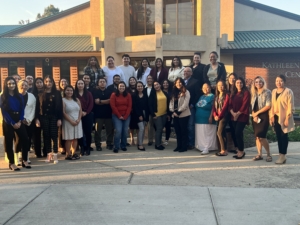
Graduates of the 2022 PreLaw Undergraduate Scholars Program
The Law School Admission Council (LSAC) Prelaw Undergraduate Scholars (PLUS) Program was created to teach Latinx and indigenous students how to prepare for, enroll in and succeed in law school and beyond.
It’s a partnership between Heritage and Washington’s three law schools – Seattle University School of Law, University of Washington School of Law, and Gonzaga University School of Law – and the following legal services organizations:
• Benefits Law Center
• Columbia Legal Services
• Northwest Justice Project
• Northwest Immigrant Rights
• Office of Civil Legal Aid (OCLA) • TeamChild
These groups continue to provide the students’ with connections to practicing lawyers and judges, a crucial component of the program.
A long list of questions and issues informed the robust syllabus for Heritage University’s first PLUS program, which included these units:
• “Envisioning Yourself as a Lawyer” allowed students to absorb individual narratives from several Latinx and indigenous lawyers who grew up in Central Washington. Each discussed the unique path they took in becoming practicing lawyers and judges. Current law students spoke to the students as well, with role play centered on how lawyers interview and counsel clients.
• “Wrestling the Beast” explained the Law School Admission Test (LSAT). “Nuts and Bolts of the Law School Admission Process” was a full three-hour session. “Financial Planning for Law School” included individual one-on-one counseling sessions.
• A mock law school class gave students the opportunity for individual mentoring sessions with Central Washington Legal Aid and Community Lawyer Mentors.
• Students experienced an evening with Chief Justice Steven González and Justice Helen Whitener of the Washington Supreme Court.
• Mentors and mentees were encouraged to meet outside class sessions to explore job shadowing, internships, or simply ongoing connection and resources.
• “It Takes a Village” discussed practical ways to build support systems dealing with family, emotional, cultural, financial, academic and community issues.
